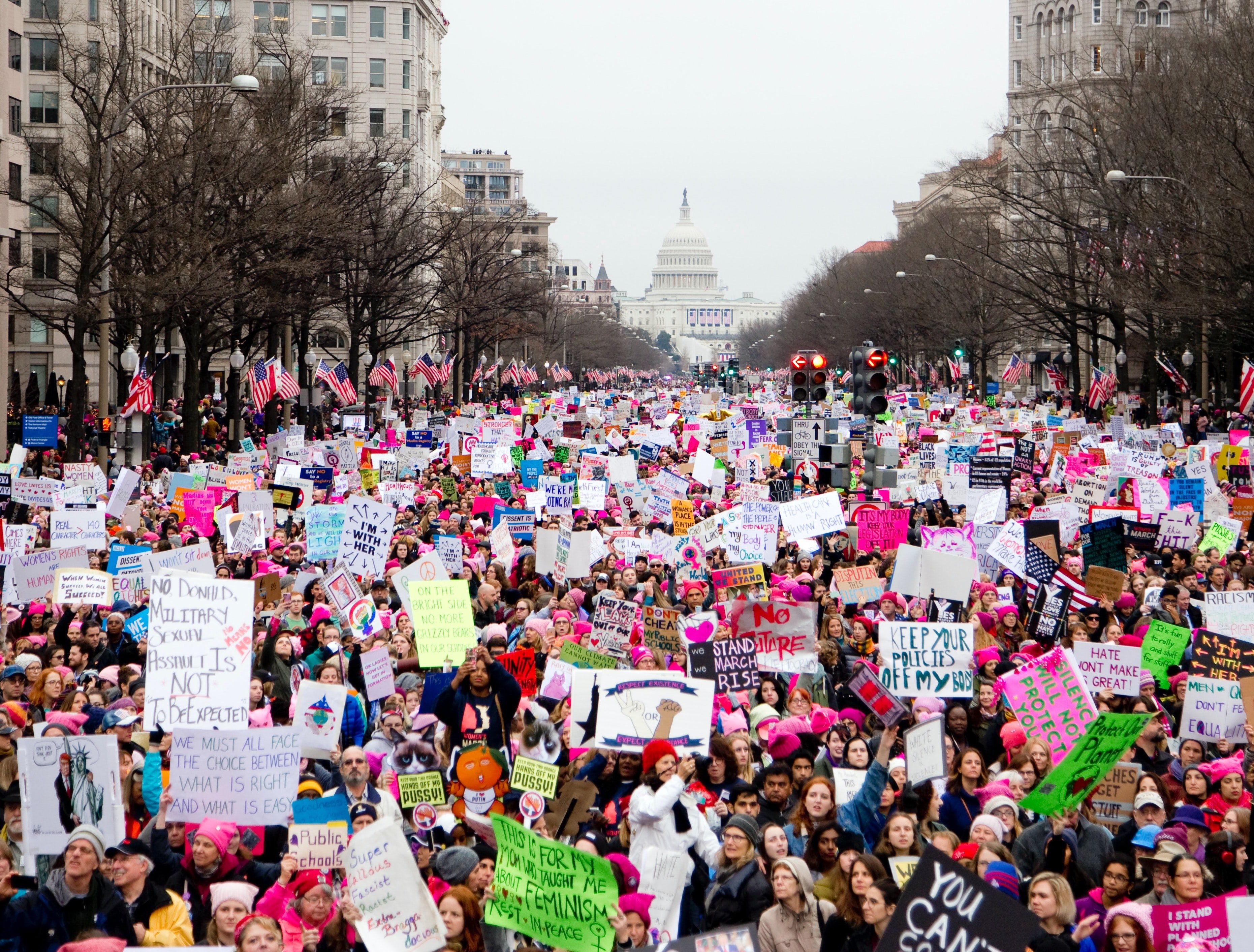![]()
Recent accusations towards Women’s March leaders marked an increasing trend of anti-Semitism across the United States.
Tamika Mallory and Carmen Perez, co-chairs of the Women’s March national organization, posted photos on Instagram in 2017 with Louis Farrakhan, leader of the black nationalist group Nation of Islam, according to CNN. During a speech in November 2017, Farrakhan said that “Jews who ‘owned a lot of plantations’ were responsible for undermining black emancipation after the Civil War,” and in October 2018, he said he wasn’t anti-Semitic, but rather “anti-termite,” according to the Anti-Defamation League.
These accusations of anti-Semitism are now coming to light, due to an investigative report released in December 2018 by Tablet, a Jewish news and culture magazine.
In January 2018, the Women’s March issued their Unity Principles stating, “We must create a society in which women, in particular—in particular Black women, Native women, poor women, immigrant women, Muslim women, and queer and trans women—are free and able to care for and nurture their families, however they are formed, in safe and healthy environments free from structural impediments,” according to Tablet, a Jewish news magazine.
Many women, including Mercy Morganfield, a former spokesperson for the Women’s March, questioned why Jewish women were left out of the statement. In an interview with Tablet, Morganfield said, “There are no Jewish women on the board. They refused to put any on. Most of the Jewish people resigned and left. They refused to even put anti-Semitism in the unity principles.”
Anti-Semitism accusations left many women debating whether they should be involved in the January 2019 march. Sophie Mumba, freshman intercultural studies major, was struck by the irony of the march’s purpose. “How are you marching for women but not including all women? It’s like what we’re talking about in the women’s suffrage class. You can’t just march or do something for a particular [group] if you’re trying to get something improved. You can’t just be for one group, you have to include everyone in it,” Mumba said.
In the Women’s March initial meeting in November 2016, according to Tablet, “Perez and Mallory allegedly first asserted that Jewish people bore a special collective responsibility as exploiters of black and brown people … [and] claimed that Jews were proven to have been leaders of the American slave trade.”
In response to these allegations, and when asked whether she condemns Farrakhan’s statements, Mallory said in an interview with The View, “I don’t agree with these statements.” When asked again if she condemned his rhetoric, Mallory said, “No, no, to be very clear, it’s not my language, it’s not the way that I speak.”
While some women are frustrated at her lack of condemnation and alliance with Farrakhan, others believe it is part of her free speech. “If she doesn’t believe that what he’s saying is wrong, then that’s her choice. We all get to make our own choices,” Jo Parrish, sophomore political science major, said. “If everything she said was about the dude, then I wouldn’t be supportive of her, but she just posted a picture on Instagram and goes to events, that doesn’t seem like that much of a big deal. Most of the people who are higher in society hide a lot of stuff that they believe or that they do that we don’t know about, but we still support them.”
However, Toby Klein, a Jewish doctoral student at the University of Arkansas, believes everyone should take a stand against Farrakhan, his anti-Semitic rhetoric and his threats against minorities, including LGBTQ+. “Jews are commanded to remember our oppression—on holidays including Passover, the story of the Exodus from Egypt—so when Farrakhan … spews hatred towards minority groups, even if they’re not Jewish, Jews often feel a sense of obligation to protect and help those oppressed and attacked,” Klein said. “The Women’s March promotes itself as an inclusive organization, and as someone with multiple, intersecting, minority identities, I am not comfortable with Mallory as a co-president. In the wake of Pittsburgh, anti-Semitism cannot be relegated as hate-speech: it’s a tangible, and unfortunately, sometimes fatal reality in America.”
According to the Anti-Defamation League, anti-Semitic incidents “including assaults, vandalism, and attacks on Jewish institutions” increased nearly 60 percent from 2016 to 2017. In Arkansas, there were two reports of harassment and one reported vandalism.
Klein has experienced anti-Semitism in northwest Arkansas and other regions of the country. “I have been the brunt of a multitude of Holocaust ‘jokes’ including ones about the gas chambers, the ovens, and I was even told that Jews deserved the Holocaust … At my previous university, I had swastikas drawn on my door, and was told that the [Trump] wall was made to keep people like me out,” Klein said.
She also shared that being Jewish can be difficult in northwest Arkansas through the “tokenization of Jews … [like] a professor saying, ‘explain why your people do this,” Klein said. “Events are held on Jewish holidays, making certain things like classes and events inaccessible to me. Kosher options are not easily available here.”
Klein encourages college students to take a stand against anti-Semitism and learn more about the history of Jewish culture and religion. “More than anything, speak up. If you hear someone make a Holocaust ‘joke,’ let them know it’s not funny and it’s not acceptable. Use the power that you have as someone not targeted by these jokes, and make it known it’s not okay.”
“Jews are both a culture, a religion, and to some, an ethnicity. Thus, there are Jews of color, there are LGBTQ+ Jews, and there are Jews of all different abilities and statuses,” Klein said. “Jews are commanded to remember our history of oppression, and to repair the world. Taken together, one can stand up for anti-Semitism by helping create a society void of discrimination, period.”
Photo courtesy of Vlad Tchompalov





